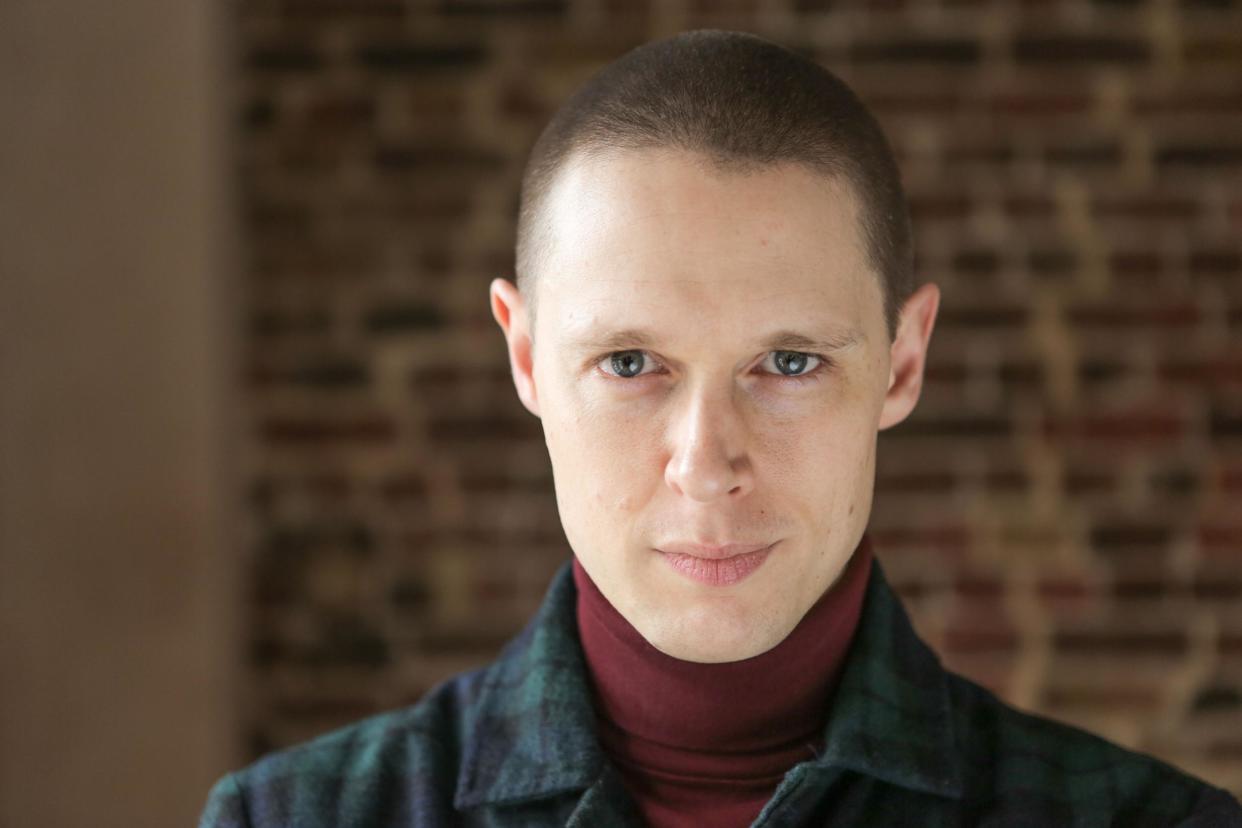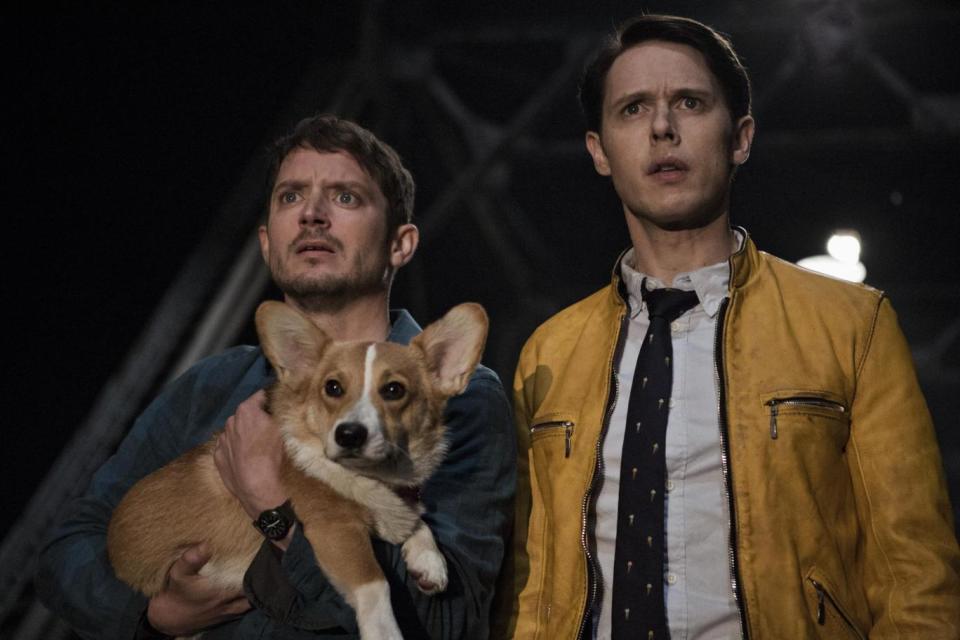Samuel Barnett on being back on stage, the end of Dirk Gently and being a History Boy

Samuel Barnett arrives for our interview looking rather meek. “This morning, we got to the,” he whispers it, “…sex scenes.”
I’d describe it as a hair-raising moment but Barnett — best known for playing Posner in the original production of The History Boys and heading up the Netflix sci-fi show Dirk Gently’s Holistic Detective Agency — is currently bald. He is in the middle of rehearsals for Kiss of the Spider Woman at the Menier Chocolate Factory, and he and co-star Declan Bennett have had their heads shaved to play two men sharing a prison cell. His strategy for these cold months? “Constant hattage”.
The play is based on Manuel Puig’s 1976 novel, set in Argentina under Isabel Perón’s Right-wing government. The novel was banned on its publication and multiple adaptations since have diluted its radical power; there’s been a film, a musical, and a previous stage version. This new version, by Motorcycle Diaries screenwriter José Rivera, aims to rediscover the original’s essence.
Barnett was given the part of Molina, a gay man imprisoned for his sexuality, as a direct offer — something he says “never happens” — but he immediately asked director Laurie Sansom if he was right for the role. In the 1985 film, Molina was a transgender woman — a deviation from the original novel borne out of Hollywood anxiety about homosexuality.

“William Hurt came along — this big, strapping, muscular man — and it was the Eighties, and they went ‘we don’t buy you as this gay, effeminate creature’. So they shoved him in a sarong and put a wrap on his head, and made him out to be a man who wanted to be a woman,” Barnett says, with some sadness. “It was Hollywood’s way of dealing with a gay character, going, ‘oh, they’re not gay, they want to be a woman’. So it undermines all of the gay politics.”
But it’s not a “gay play”, Barnett stresses. He finds the label limiting. “It’s also about loneliness, intimacy, lack of connection, not feeling part of something. I think everybody has felt that at some point — even the most privileged white male.”
When talking about acting, Barnett, 37, often forewarns me that what he’s about to say might make him sound like a “w*****”. He doesn’t — he’s straightforward and honest, and never once describes it as “his craft”. He admits that this is the first role where he’s been able to cry on cue.
“It’s felt close to me in a way I really didn’t think it would,” he says. “Sometimes playing Molina is like me 20 years ago, when I was growing up, lonely and confused, feeling isolated and struggling with myself, and in quite a fatalistic way thinking: ‘happiness isn’t truly an option’. I’d look around at people, couples, romance, love, and go ‘I’m on the outside of that and I’m not going to have that’. It’s triggered memories of being a teenager when I was just young and drunk, trying to feel better about life.”
Most of Barnett’s twenties were taken up by playing Posner in the History Boys, a “gay, small, Jewish” sixth-former from Sheffield trying to get into Oxbridge. He never gets bored of talking about it.
“It was such an extraordinary part of my life,” he says. There’s a fondness in his voice when he talks about it; the cast — which included James Corden, Dominic Cooper and Jamie Parker — are “like family”.
He realised retrospectively that playing an unhappy teenager every night from the age of 24 to 27 had made him feel “a bit stunted” and that when it finished he felt he “physically changed”. But it was also something that he didn’t want to end — Alan Bennett wrote in his diaries that Barnett fought back tears while delivering his lines for the final performance.
“And now we’re all getting married and having babies,” he smiles.
But, contrary to the fandom’s wishes, none of them are getting married to each other. There’s a blog documenting every tweet Barnett and co-star Jamie Parker have written to each other. “Jamie texted me a link to it saying, ‘you need to look at this’, and we were both like, ooh dear! There’s so much Dirk Gently stuff too. It’s amazing how people want to homoeroticise or sexualise things.”
Dirk Gently, BBC America and Netflix’s major TV adaptation of books by Douglas Adams also starring Elijah Wood, was recently cancelled after two seasons. Barnett’s disappointment is obvious. Everyone involved thought there was going to be a third — “we had an outline for it and everything,” he says.
Fans have rallied round — an online petition to save the show has 90,000 signatures, with many claiming that it has saved their life, moved by its message that “everything is connected” and no one is alone.
I ask Barnett if recent sexual harassment allegations against the show’s writer, Max Landis, have affected how he looks back on it. He ruminates for a while. “No, because the show is not one person,” he says. He feels sad about it, but he also doesn’t know how to talk about it — “not because I don’t know what to say. I don’t know anything, is the problem.”
As far as he knows, none of the allegations against Landis came from anyone on Dirk Gently. “Oh my God, the climate we’re in, if I’d known anything about that stuff, I mean, I would have said something. I cannot function around that behaviour.” He says he’s called out bullying in previous jobs, and has no time for anyone who chooses to work with abusers while aware of their abusive behaviour. “You have to question, why the hell are they doing that? If you don’t know, what can you do?”
Barnett is getting ready for a year of theatre, with another stage project lined up that he can’t talk about yet. His boyfriend, Adam Penford, recently took over as artistic director of Nottingham Playhouse with a well-received revival of Beth Steel’s Eighties miner drama, Wonderland, but Barnett confides that he doesn’t have the “right kind of brain” to try his own hand at directing.
Kiss of the Spider Woman will be Barnett’s first time on stage in three years. Final question: is stage better than screen? “God, I’m going to sound like a w*****. Are you ready? The stage is where I’m in my most natural element. There’s just something about it: rehearsing, mining a text, watching it grow, having a live audience. I love it,” he says, sounding, as ever, nothing of the sort.
Kiss of the Spider Woman is at the Menier Chocolate Factory, SE1 (020 7378 1713, menierchocolatefactory.com) from tonight until May 5

 Yahoo News
Yahoo News 
